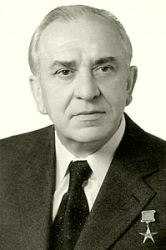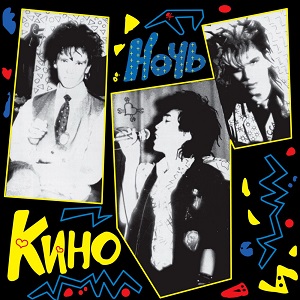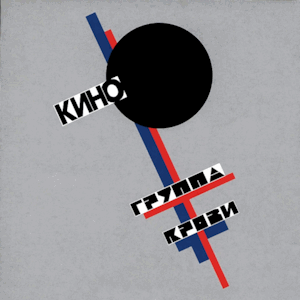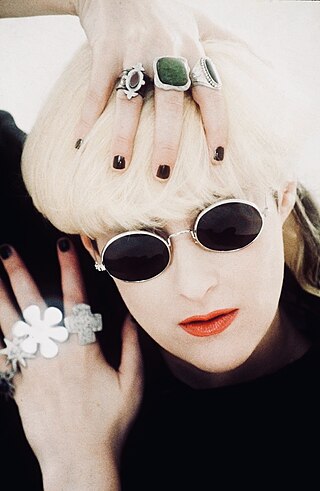
Konstantin Ustinovich Chernenko was a Soviet politician and the seventh General Secretary of the Communist Party of the Soviet Union. He briefly led the Soviet Union from 1984 until his death a year later.

Viktor Vasilyevich Grishin was a Soviet politician. He was a candidate (1961–1971) and full member (1971–1986) of the Politburo of the Central Committee of the Communist Party of the Soviet Union.

Viktor Robertovich Tsoi was a Soviet singer-songwriter and actor who co-founded Kino, one of the most popular and musically influential bands in the history of Russian music.
Kino is a Russian rock band formed in Leningrad in 1981. The band was co-founded and headed by Viktor Tsoi, who wrote the music and lyrics for almost all of the band's songs, until his death in 1990. Over the course of eight years, Kino released over 90 songs spanning over seven studio albums, as well as releasing a few compilations and live albums. The band's music was also widely circulated in the form of bootleg recordings through the underground magnitizdat distribution scene. Viktor Tsoi died in a car accident in 1990. Shortly after his death, the band broke up after releasing their final album, consisting of songs that Tsoi and the group were working on in the months before his death.
Russian hip hop refers to hip hop music recorded in Russia or in the Russian language in former Soviet states such as Ukraine, Belarus, and Kazakhstan. Hits by Russian rappers are included in the soundtracks of some PC-games and have formed part of several popular internet memes.

Nachalnik Kamchatki is the third studio album by Soviet rock band Kino. The name of the album is a play on the title of the 1967 Soviet film Chief of Chukotka.

The Tsoi Wall is a graffiti-covered wall in Moscow, dedicated to musician Viktor Tsoi and his band Kino. The wall is located at the house №37, at the intersection of Arbat Street and Krivoarbatsky Lane and is considered one of Moscow's landmarks. It is customary for Tsoi's fans to leave a broken lit cigarette in the special ash plate by the wall.

Noch is the fifth studio album by Soviet rock band Kino, released in 1986. It is the group's first official album release.

Gruppa krovi is the sixth studio album by Soviet post-punk band Kino, first released in 1988. Released at the height of Perestroika and Glasnost, together with a crime thriller titled The Needle released in the same year starring lead vocalist Viktor Tsoi, it would go on to be the band's most popular album both inside and eventually outside the Soviet Union, with songs from the album, including the title track, commonly being listed among top 100 lists of Russian music.

Sergei Alexandrovich Solovyov was a Soviet and Russian film director, producer, screenwriter, and actor. In 1993 he was awarded the People's Artist of Russia title.

Yuri Dmitriyevich Kasparyan is a Russian musician best known for his time as the guitarist of the Soviet rock band Kino and as a member of Vyacheslav Butusov's group U-Piter.

Assa (Асса) is a 1987 Soviet crime film directed and co-written by Sergei Solovyov. It became a cult film, mainly due to the fact that it was one of the films that brought Russian rock music from the underground into the mainstream. Solovyov made a sequel to the film twenty years later, 2-ASSA-2.
"Zvezda po imeni Solntse" is a song by the Soviet rock band Kino from the album of the same name released in 1988. The song is generally considered to be one of Kino's most popular songs. It is popular among novice guitarists in Eastern Europe, and there are many cover versions. The song is broadcast daily by Russian radio stations.
![<i>The Needle</i> (1988 film) 1988 [[Soviet Union]] film](https://upload.wikimedia.org/wikipedia/en/b/bb/The_Needle_film_poster.jpg)
The Needle is a 1988 Soviet thriller film. It stars rock musicians Viktor Tsoi and Pyotr Mamonov. The film premiered on 16 September 1988 in Almaty and in February 1989 in Moscow.

Joanna Stingray is an American singer, actress, music producer and socialite. She was a key figure in popularizing Soviet and Russian rock music and culture in the West in the 1980s.

Leto is a 2018 Russian musical film directed by Kirill Serebrennikov that depicts the Leningrad underground rock scene of the early 1980s. The film draws loosely from the lives of the Soviet rock musicians Viktor Tsoi and Mike Naumenko. It was selected to compete for the Palme d'Or at the 2018 Cannes Film Festival, where it won the Cannes Soundtrack Award. Leto also won the Best Production Designer at the 2018 European Film Awards.

Elizaveta Andreevna Gyrdymova, better known by her stage name Monetochka, is a Russian singer-songwriter.

Posledniy geroy, initially released in France as Le Dernier Des Héros, is an album by Soviet rock band Kino, which is a collection of re-recorded songs by the band. The album is notable for containing one of the band's most famous songs, "Khochu peremen!", which became a Perestroika anthem. The album was first released in France due to the band's newfound popularity abroad.
The Square of Changes is the name of a popular courtyard in Minsk, Belarus, located at the intersection of Chervyakov, Kakhovskaya, and Smorgovsky streets. It appeared spontaneously in August 2020 during the protests after the sixth presidential election in Belarus. On the wall of a ventilation booth, unknown people painted a mural of two sound engineers from the Minsk State Palace of Children and Youth, who played Viktor Tsoi's song "Khochu Peremen" at the official pro-Lukashenko event on August 6, 2020 in Kiev Square, Minsk.












![<i>The Needle</i> (1988 film) 1988 [[Soviet Union]] film](https://upload.wikimedia.org/wikipedia/en/b/bb/The_Needle_film_poster.jpg)



